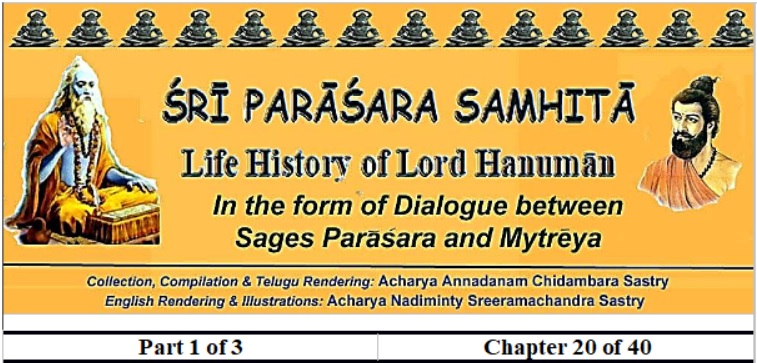
20th Chapter (VimśatimahPaţalah)
“Narration of the Power of the Revered Hanumān
16-letter Mantra”
(Śrī Hanumatşōdaśārnavaprabhāvakathanamm)
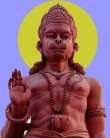
श्रीपराशर:
हनुमत्षोडशार्णस्य माहात्म्यमधिकं द्विज:
त्रूणु वक्ष्यामि मंत्रो यं भुक्तिमुक्तिफलप्रद:।। 1
Parāśara
(Always perform under the guidance of a Guru)
Şōdaśākşara
“Oh! Best of Brahmins! Mytrēya! The Hanumān’s great 16-lettered şōdaśākşara mantra’s power is colossal. It ptovides all needs in the present life (loukikabhukti) and liberation to the other world (aloukikamuukti). (1)
अगस्त्यऋषिरेतस्य गायत्री छन्द उच्यते
सुवर्चलावल्लभस्स हनूमान् देवता भवेत्।। 2
For this mantra, the sage is Agastya, meter (chandas) is Gāyatrī, god is the lord (spouse) of Suvarchala, i.e., Hanumān. (2)
बीजं पिंगलनेत्राय शक्तिश्चैव महाबल:
धनंजय: सखानाम कीलकं समुदीरितम्।। 3
The seed mantra is ‘Piñgaļanētrāya’ (to the burnished gold like eyed one), the power (śakti) is mahābalah (mightily strong) and the key (kīlakam) is ‘Dhanjayasakhā’ (friend of Dhananjaya = Arjuna). (3)
सुवर्चलावल्लभस्स हनूमान् देवता भवेत्
तत्प्रसादस्य सिद्ध्यर्थे विनियोग: प्रकीर्तित:।। 4
Hanumān the Suvarchalavallabha (lord or spouse) of Suvarchala) is the god (dēvata). Hence, it has to be said as dedicated (viniyōgah) to Him, i.e., say ‘Suvarchalā vallabha Śrī Hanumat prasāda siddhyarthē viniyōgah’. (4)
न्यासद्वयं तत: कुर्यात् क्रमेणैवमुदाहरेत्
आदौ संजीवनी हत्र्रे कालनेमिहराय च।। 5
Then both the añga and kara nyāsas have to be performed. Then say in proper order as I am going to explain. First say ‘sanjīvana gāhartrē namh’, i.e., ‘I bow to the one who took hold of the of Sanjīvana mountain’. Similarly say, ‘I bow to the destroyer of Kālanēmi’ (a demon), (5)
भीमसेनाग्रजायेति भरतं रक्षकाय च
धान्यमाली शापहत्र्रे तत: छाया प्रहारिणी।। 6
Then say ‘I bow to the’. ‘elder brother of Bhīmasēna (middle one of the 5 Pāndava brothers)’, ‘saver of Bharata’ (younger brother of Lord Śrīrāma), ‘reliever of the curse of Dhyānamālī’ (one of Rāvaņa’s spouses) and the ‘destroyer of the female shadow demon (Chāyārākşasi), (6)
दैवतांते करांते च चतुथ्र्यां च नमो भवेत् 7
Then say I bow to ‘daivatāya (godliness) namah’ and ‘karāya (hand) namah’. (7)
आदौ प्रणवमुच्चार्य मायाबीजं तत: परम्
श्रीबीजं तत्तदुच्चार्य श्रीवर्णं च तत:परम्।। 8
First saying the ‘Ōmm’, then the magical seed letter ‘hreemm’, then the seed letter ‘śreemm’, then the letter ‘Śree’, then ‘Suvarcchalā vallabhāya Hanumatē’ and complete the mantra by saying ‘swāhā’ at the end; i.e., ‘Ōmm hreemm śreemm Śree Suvarcchalā vallabhāya Hanumatē swāhā’ is the mantra meaning ‘offering to revered Hanumān, the dear husband of Suvarcchala’. (8)
सुवर्चलावल्लभेति हनुमत्पदमुच्चरेत्
अन्ते स्वाहावदेदेवं मन्त्रमेनं प्रपूरयेत्।। 9
Meditation (dhyāna) – ‘I contemplate on the four shouldered (caturbhuja) Lord Hanumān, wearing bright silk clothes, giving assurance of protection (abhaya) with one hand, giving benevolence (vara) with another, holding food (bōjya) in yet another hand, with the fourth hand around the lower back of Suvarchalā, with the two eyes full of mercy (dayā) and life-giving (amŗta) elixir. (9)
ध्यानम्
एकेनाभयदं परेण वरदं भोज्यं परं चा·परे
अन्येनापि सुवर्चलाकुचयुगं हस्तेन संबिभ्रतम्
कारुण्यामृतपूर्णलोचनयुगं पीतांबरालंकृतम्
रम्यं वायुसुतं चतुभुर्जयुतं ध्यायेद् हनूमत्प्रभुम्।। 10
The above mantra has to be repeated 100,000 times systematically. In that 1/10th for tarpaņa, hōma has to be performed in 1/10th and for another 1/10th perform the conclusion and then one has to be have a satisfactory meal. (10)
लक्षमेकं पुरश्चर्या दशांशं तर्पणं भवेत्
तद्द्शांशं होमकर्म तद्दशांशं तु भोजनम्।। 11
Kapila’s Story
I will narrate an episode that took place long back over this issue. On the banks of River Gangā, Bārhaspatayapura named (11)
अत्रैवोदाहरंतीममितिहासं पुरातनम्
बार्हस्पत्यपुरं नाम गंगातीरे महामुने! 12
Village existed. There lived a Brāhmin named Kapila. He knew the meaning of all the science scriptures. He studied Vēda and all its parts (Vēdāñgas) till the end. (12)
स्थितो जनपदस्तत्र कपिलो नाम भूसुर:
सर्वशास्त्रार्थतत्त्वज्ञ: वेदवेदांगपारग:।। 13
He was a destitute and had many children. Forgetting all the attachments, he started reciting Hanumat şōdasākşarī (16-lettered) mantra standing in River Gangā. (13)
दरिद्रो बहुपुत्रस्सन्वीतरागस्तु शोधन:
भागीरथ्यां जपेन्मंत्रं हनुमत्षोडशाक्षरम्।। 14
So reciting till evening, he used to reach home with some edible leafy vegetables. His wife used to beg around some rice etc. and somehow used to prepare a meal along with the edible leaves, on which they used to survive. (14)
असायं प्रत्यहं शाकं गृहीत्वा गृहमेति स:
इतस्ततस्तस्य भार्या याचित्वा तण्डुलादिकं
अन्नं पचति तच्छाकं तेन जीवति नित्यश:।। 15
For many days he continued feeling each day like a minute (15)
एवं बहुतिथि: तस्य देहयात्रां प्रकुर्वत:
व्यतीयाय सुखेनैव प्रत्यहं निमिषो यथा।। 16
Divine Appearance of Hanumān
To the great soul Kapila, who used to take bath early in the morning in the auspicious waters of Gangā and and recite the Hanumanmantra. (16)
प्रात:स्नात्वा शुचिर्भूत्वा भागीरथ्यां शुभोदके
जपतो हनुमन्मंत्रं कपिलस्य महात्मन:।। 17
Once the kind-to-devotees, spouse of Suvarcchala and One who recites the holy name of the scion of Raghu clan, Śrīrāma appeared divinely (pratyakşa). (17)
आविर्बभूव हनुमान् एकदा भक्तवत्सल:
सुवर्चलापतिश्श्रीमान् ध्यायमानो रघूद्वहम्।। 18
He has four arms, was bright as the Moon, was wearing a white holy thread (janēv), wearing ear rings studded with nine varieties of precious stones, wearing silks, shining with pearly chains worn, wearing orange orpiment coloured grass-girdle and wearer of a white vertical line in the middle of the forehead. (18)
चतुर्भुजश्चंद्रसमप्रभावान्
सितोपवीतिर्नवरत्नकुण्डल:
दुकूलमुक्तामणिहारशोभित:
पिशंगमौंजीधवलोध्र्वपुण्ड्र:।। 19
One who bestows the four puruşārthas (the four human emancipations – dharma = moral goal, artha = wealth, kāma = wish or action; desires and emotions, the goal of these three being attainment of mōkşa = salvation) with His four arms to the numerous divotees, giver of happy frame of mind to Mother Sītā, such Hanumān the sanctifier of all the worlds, (19)
करैश्चतुर्भिश्चतुरो पुमर्थान्
ददाति यो भक्तजनाय नित्यम्
सीतामनोमोदकरो हनूमान्
पुनाति लोकत्रितयं महात्मा।। 20
Along with (His followers) Jambavan, Vinata, Nīla, Panasa, Gandhamādana, Suşēņa, Mainda, Dvividaand others, (20)
जांबवान् विनतो नीलो-पनसो गन्धमादन:
सुषेणमैन्दद्विविदमुखै: परिवृत: कपि:।। 21
Seeing such praise worthy Hanumān, the Brāhmin, reciting invocation to Him with folded hands, reverently worshipped Him in his heart and with the resultant tears of joy and a smile, (21)
विलोक्य तं स्तोत्रपरम्पराभि:
स्तुवन्ननमस्कारपुरस्सरं द्विज:
विधाय पूजां मनसोपचारै:
स्मितो मुदा वाष्पकणाकुलेक्षण:।। 22
That devotee was lost for a while in the ocean of happiness and then, recovered, he said so, (22)
एकमुहूर्तं निर्मग्नो महदानन्दसागरे
चिराय लब्ध्वा संज्ञां वै इदमाह कथंचन।। 23
‘Oh! Lord! I am blessed from this moment on, having seen your pious self; I am freed from the troubles of seeking. I will not think of the abode of the God of Death (Yama). (23)
अद्यप्रभूति योग्यो हं त्वया सन्दर्शनात्प्रभो!
सर्वतापविनिर्मुक्तो नस्मरेयं ममालयम्।। 24
Oh! Best of monkeys! God! For kindly showing mercy on me, accept the fruits or leaves offered by me with devotion. (24)
भक्त्या समर्पितं तात! फलं वा पत्रमेव वा
मदनुग्रहलाभेन गृहाण कपिपुड्गग्व!।। 25
Your wife is Sun God’s daughter Suvarcchala. Your golden cloths are heavenly. You have diamond studded ear rings, a pearl chain around your neck and great heroes like Sugrīva, Añgada and Gandhamādan and others are with you. Oh! Lord Hanumaān! What can I offer that you like, when you already have all your wishes fulfilled? (25)
जाया चा पि सुवर्चला रविसुता दिव्यं च हेमांबरम्
माणिक्यांचितकुण्डले श्रवणयो: कण्ठे च मुक्तिवलि:।। 26
Seeing such emotion in the great-soul Kapila’s devotion, Lord Hanumaān satisfied him by giving great boons. (26)
सुग्रीवाड्गद गन्धमादनमुखा: सत्पार्षदास्सन्ति ते
किं दास्यामि मन:प्रियं हि हनुमन् संपूर्णकामो भवान्।।27
That Kapila, sought salvation (mōkşa) and nothing else as he left all mundane wishes. He asked Lord Hanumaān, ‘Who are the other venerable monkeys?’ (27)
एवं स हनुमान् तस्य कपिलस्य महात्मन:
भक्त्युद्रेकं समुद्वीक्ष्य नन्दयामास तं वरै:।। 28
Lord Hanumaānsaid so, ‘This mountain of a monkey is Gandhamādana. He shines as he is made of many elements (dhātu). He is surrounded by banana groves and possesses beautiful peaks. (28)
न ययाचे वरं कंचिन्मुमुक्षुर्वीतरागवान्
हनूमन्तमुवाचेदं एते के वानरोत्तमा:।। 29
Oh! The best of Brahmins! These great ones are all in my council (parişat). These on the side are Jambavān, Vinata, Nīla, Panasa, Gandhamādana, Suşēņa, Mainda, Dvivida, who are all capable of performing my works. (29)
श्रीहनुमान्
गन्धमादननाम्ना वै पर्वतो धातुमण्डित:
हेमरम्भातरुवृत्त: श्रीमान् शिखरभूषित:।। 30
You perform my abhişēka (washing by pouring water etc), dhoopa (present incence), deepa (lamp-light) and naivēdya (pious food offering). (30)
एते तत्र महाभागास्संति मत्पार्षदा: द्विज
जांबवान् विनतो नील: पनसो गन्धमादन:
सुषेणमैन्दद्विविदा मम कार्यधुरन्धरा:।। 31
By the water poured during daily abhişēka that dropped off the tip of my tail (vāla) a well-known river by the name ‘Vālasāgara’ took birth. (31)
नित्याभिषेकं कुर्वन् तं धूपदीपफलादिभि:
दिनाभिषेकतीर्थेन वालार्कात्प्रत्युतेन च
वालसागरनाम्नात्र नदी जाता सुपावनी।। 32
Any sinner bathing in it will become free of sins. He will obtain achievement (siddhi) right away without any doubt. Oh! Best of Brāhmins! If it is worshipped, I will become very happy. (32)
तत्र स्नात्वा च पापात्मा शुद्धो भवति मानव:
सर्वसिद्धिमवाप्नोति शीघ्रमेव न संशय:
अनेनाराधनेनाहं सन्तुष्टो द्विजसत्तम:।। 33
Hanumān said, ‘Oh! Monkey warriors! Seek appropriate boons’. (33)
वरयध्वं यथा न्यायं इत्यवोचन्महात्मन: 34
Very happy Jāmbavan and other renowned ones said, ‘We are already very well taken care of by you. Nothing more is needed’. Then Hanumān said, (34)
ऊचुस्ते परमप्रीता जांबवत्प्रमुखा इमे
प्राप्नुयाम: परं पूजां भवता वरणे वयम्।। 35
Oh1Brāhmin! First these very best ones deserve worship. Only then give me the best of your devotion. (35)
उत्तमान्तान्महाभागान्-आराध्य प्रथमं द्विज:
अनन्तरं तु तत्पूजां कुर्वंतु मम चोत्तमाम्।। 36
I become very happy by worshipping my devotees. Insulting my devotees means insulting me greatly. (36)
मद्बक्ताराधनादेव अत्यन्तं परितोषवान्
मद्भस्यावमानेन ह्मत्यन्तमवमानित:।। 37
My incarnations are many. My forms are even a lot more. I appear before my devotee in whatever form he/she worships me. (37)
ममावतारा: बहव: मद्रूपाणि बहूनि च
यथा मां भजते भक्तस्तथैबाविर्भवाम्यहम्।। 38
Kapila, who respectfully bowed to the Son of Añjana, Hanumān was told as above. Thus having satisfied the Brāhmin with nice words, (38)
एवमुक्तस्तु कपिलो नमस्कृत्यांजनासुतम्
एवं हितोपदेशेन तोषयित्वा द्विजोत्तमम्।। 39
Añjanēya left, mentally taking the name of Rāma again and again. Kapila left for home after performing the daily ritual. (39)
जगाम मनसा रामं चिंतयन्नंजनासुत:
संध्यामुपास्य विधिवत् कपिलस्सदनं ययौ।। 40
Kapila’s Wife doubts
When his wife asked about his not bringing leafy vegetables, he said, ‘Oh! Good lady! Today, while I was performing recitation (japa), (40)
तस्य भार्यावदद्विप्रं शाकं नानीतवानपि
सो वदत्तामद्य साध्वि हनूमान् जपतस्सत:।। 41
Lord Hanumān, because of extreme affection for devotees, he gave me divine vision (pratyakşa). Because I went to His divine presence in welcome, addressed and invoked, I could not get time to fetch the leafy vegetables’. (41)
भगवान्भक्तवात्सल्यान्मम प्रत्यक्षतां गत:
तेन संभाषमाणस्य प्रत्युत्थानाभिवन्दनै:
स्तुवतो नावकाशो भूच्छाकस्याहरणे मम।। 42
Hearing him say so, his wife asked, ‘Oh! Brāhimin Sir! If Hanumān Himself has blessed you with his holy appearance, how can there be destitution in our house still? (42)
इति श्रुत्वा वचस्तस्य भार्या सा कौतुकान्विता
हनुमान् यदि ते ब्रह्मन् देव: प्रत्यक्षतां गत:
अस्मद्गृहे महत्क्रूरदारिद्रस्थ्स्य स्थिति: कथं? 43
If the fact that god is there and if the fact that he gave you appearance are true, our wishes would have been fulfilled; hence , I feel that it is not true. (43)
दैवं यदि भवेत्सत्यं प्रत्यक्षं वा भवेद्यदि
सर्वकामा: प्रसिध्यन्ति ह्मतो मिथ्येति मे मति:। 44
By your grace I am already blessed with many sons eaqual to Sun and many daughters equal to the Moon. (44)
त्वत्प्रसादान्मया लब्धा: कुमाराश्च कुमारिका:
बहवस्सूर्यसंकाशा: चन्द्ररेखासमा इमा:।। 45
They do not have, even for wishing, clothes or ornaments. There is no scope for fulfillment of any of my wishes even during their marriages. (45)
नाम्नाप्येषां न वस्त्रं वा न सुवर्णादिभूषणम्
न विवाहाद्युत्सवानां मन्मनोरथसिद्धय:।। 46
What is the use of teaching Vēda lessions and performing the rituals described in sŗti (Vēda learnt by listening) and smŗti (memorized scriptures)? They will not help in mitigating the fire in the bellies of the children. How can your lord protect? (46)
किं केवलैर्वेदपाठै: श्रौतस्मार्तादिकर्मभि:
न वा दंदह्ममानानां बालानां जठराग्निना।। 47
How can your Lord Hanumān protect? How can he save us with our many hungry children? (47)
कथं रक्षति दैवं ते हनुमान् वरदो ह्मत:
कथं वा त्रायते सो स्मान् क्षुधार्तान् सहपुत्रकान्।। 48
Without knowing our state of want of food, will he save us after we die? (48)
अविज्ञाय तथाप्यन्नं मृतानस्मानवत्यसौ।। 49
My father did not know that you are a worse specimen of men. That is why he married me to you. Oh! God! My children have to only imagine eating food. (49)
पिता मे न विजानाति भवन्तं पुरुषाधमम्
अहो बत सुता बाला: मनसैवान्नभोजिन:।। 50
With old clothes, tubers, roots, leaves, vegetables, lotus stalks, water and other things, grains earned by labour, insufficient needed things, (50)
पटच्छदै: कन्दमूलै: पत्रशाकबिसैर्जलै:
भृत्या चोपार्जितैर्धान्यै: अपर्याप्तैश्च वस्तुभि:।। 51
My children are just barely living. The help of your rituals (tapas) has gone waste. (51)
शरीरस्थितिमात्रेण पुत्रा जीवंति मे भृशम्
हितं सर्वमपि त्यक्तं-तपसा चैव तेन ते।। 52
Other family people – via participation in marriage, maturity and other ceremonies, via presentation of desired gifts by relatives, via worship of the great god, (52)
विवाहाद्युत्सवैरन्यै: तथा पुंसवनादिभि:
प्रीतिदानैश्च बन्धुभ्यो मुकुन्दाराधनोत्सवै:।। 53
Via service of attendants, via offer of regular hospitalities – are looking happy and healthy by themselves without being fed by any one (parents)’. (53)
वैतानिकक्रियाभिश्चाप्यातिथ्येन च सर्वदा
ह्मष्टपुष्टाश्च दृश्यन्ते न पोष्या गृहमेधिन:।। 54
Hearing that Kapila said so to his wife emaciated due to poverty, ‘Oh! Foolish woman! Listen. My rituals are not for enjoying good things of life. I am performing them for liberation’. (54)
इति श्रुत्वा वदद्विप्रो भार्यां दारिद्रथकर्शिताम्
त्रूणु मूढे! न भोगार्थं-तपो मे मुक्तिकारणम्।। 55
The she laughed and said, ‘How can that Lord give other world (pāraloukika) needs (liberation) that is difficult even for Yōgis, when He is unable to give worldly (aihika) good things?’ (55)
सा त्रूत्वा वदत्साध्वी नददात्येहिकं सुखम्
आमुष्मिकं कथं दद्याद्दैवतं योगिदुर्लभम्।। 56
Listening to such hateful words for Hanumān, that free-from-desires (rāgatyāgi) and ritual-power-rich (tapōdhani) Brāhmin has gone away leaving that place. (56)
इति त्रूत्वा तदा विप्रो हनुमद्द्वेषणं वच:
तस्माद्देशादवक्रामद्वीतरागस्तपोधन:।। 57
Hanumān’s Divine Appearce
Then, there appeared Hanumān the lover of His devotees. (57)
तत: प्रादुरभून्तत्र हनुमान्भक्तवत्सल:।। 58
दैत्यानामशनिर्नृणां कपिवरस्स्यादंजनायाश्शिशु:
मृत्यू रावणराक्षसस्य नितरां रामानुजप्राणद:
सीताहर्षधुरन्धरो रघुपते: कार्यप्रधानाग्रणी
योगिध्येयसुवर्चलाप्रियसखस्तन्मंदिरं प्राविशत्। 59
A thunderbolt to the demons, best of monkeys for people, dear child of mother Añjana, a virtual death to the demon Rāvaņa, giver of life to Rāma’s younger brother Lakşmaņa, the great powerful personality that is the cause for the happiness of mother Śitā, best among the performes of Lord Rāma’s tasks, thess one meditated upon by Yogis and the darling of Suvarcchala, Lord Hanumān’ entered that building. (58-59)
इति श्रीपराशरसंहितायां श्रीपराशरमैत्रेय संवादे श्रीहनुमत्षोडशार्णवमहामंत्रप्रभावकथनं नाम विशतितम: पटल:
Thus ends the 20th Chapter entitled “Narration of the Power of the Revered Hanumān 16-letter Mantra” (Śrī Hanumat şōdaśārnava prabhāva kathanamm) of ŚrīParāśaraSamhitā
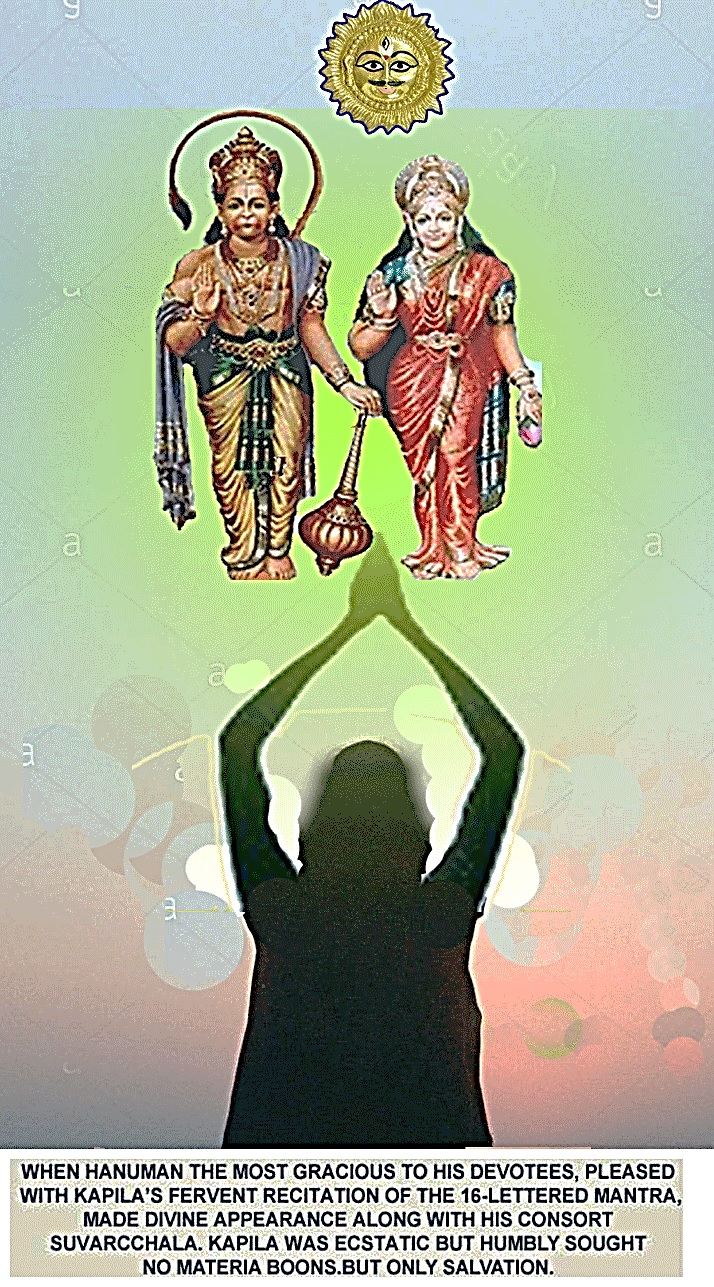
![]()

Click here to visit the Contents of the Part 1.
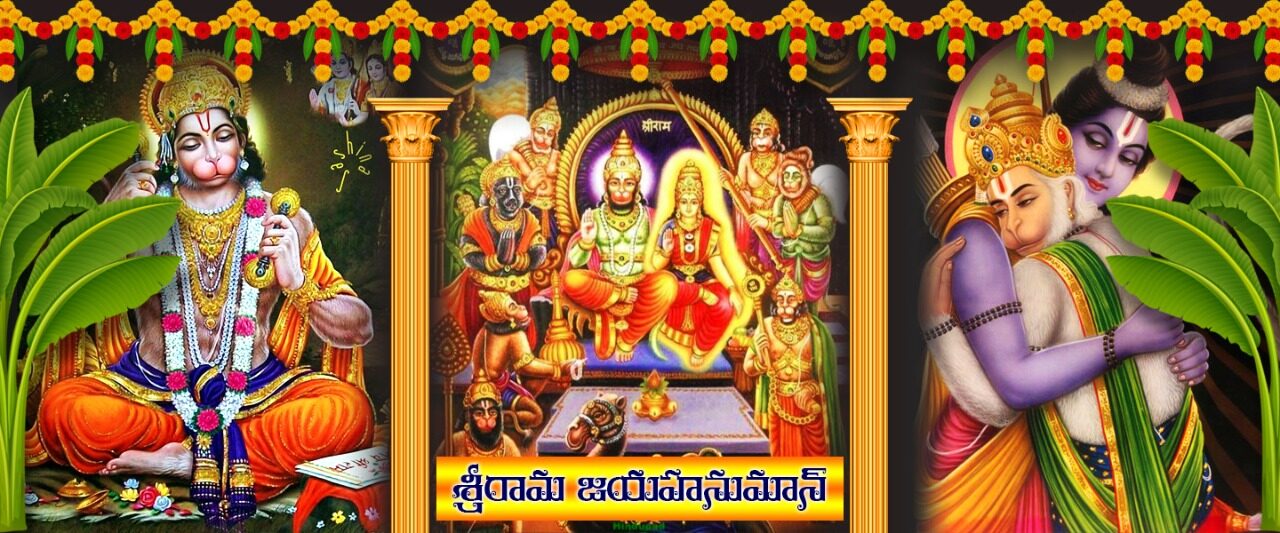
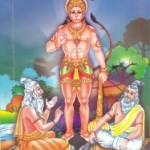

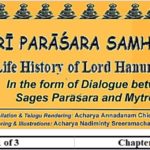

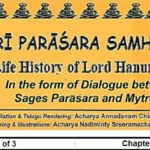

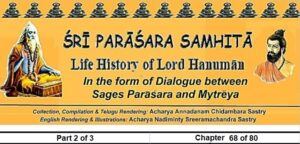
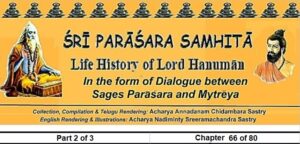
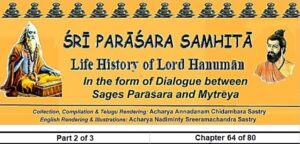
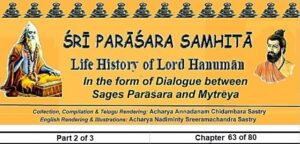
Be First to Comment